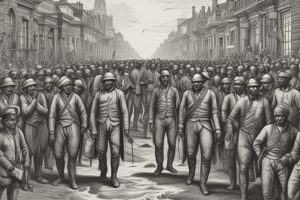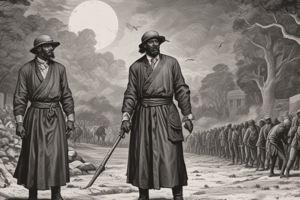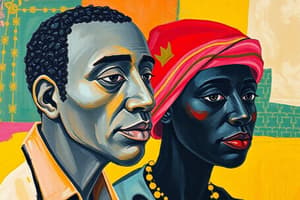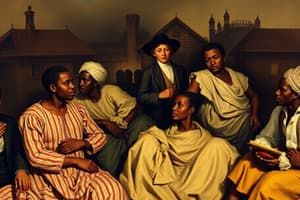Podcast
Questions and Answers
Which individual championed the immediate abolition of slavery through the publication of 'The Liberator'?
Which individual championed the immediate abolition of slavery through the publication of 'The Liberator'?
- Sojourner Truth
- David Walker
- William Lloyd Garrison (correct)
- Frederick Douglass
Which of the following figures is most associated with the concept of popular sovereignty in relation to the expansion of slavery?
Which of the following figures is most associated with the concept of popular sovereignty in relation to the expansion of slavery?
- Jefferson Davis
- Stephen Douglas (correct)
- John C. Calhoun
- Roger Taney
Which inventor significantly impacted agricultural production in the United States through the mechanization of harvesting?
Which inventor significantly impacted agricultural production in the United States through the mechanization of harvesting?
- Cyrus McCormick (correct)
- John Deere
- Eli Whitney
- Samuel Colt
Which notable figure is best known for their role in the Underground Railroad, assisting enslaved people to escape to freedom?
Which notable figure is best known for their role in the Underground Railroad, assisting enslaved people to escape to freedom?
Which religious leader is most associated with the Mormon migration to the Great Salt Lake Valley?
Which religious leader is most associated with the Mormon migration to the Great Salt Lake Valley?
Which influential figure significantly reformed the American education system during the antebellum period?
Which influential figure significantly reformed the American education system during the antebellum period?
Which transcendentalist writer is best known for the essay 'Civil Disobedience'?
Which transcendentalist writer is best known for the essay 'Civil Disobedience'?
Which prominent author penned 'The Scarlet Letter', exploring themes of sin, guilt, and redemption in Puritan society?
Which prominent author penned 'The Scarlet Letter', exploring themes of sin, guilt, and redemption in Puritan society?
Who was the commander of the Texan forces during the Texas Revolution, later becoming the first president of the Republic of Texas?
Who was the commander of the Texan forces during the Texas Revolution, later becoming the first president of the Republic of Texas?
Which Supreme Court Chief Justice presided over Marbury v. Madison, establishing the principle of judicial review?
Which Supreme Court Chief Justice presided over Marbury v. Madison, establishing the principle of judicial review?
Which explorer led the expedition that significantly mapped and documented the Louisiana Territory?
Which explorer led the expedition that significantly mapped and documented the Louisiana Territory?
Which U.S. president's policies led to the Trail of Tears and the forced removal of Native American tribes from their ancestral lands?
Which U.S. president's policies led to the Trail of Tears and the forced removal of Native American tribes from their ancestral lands?
Who served as the president of the Confederate States of America during the Civil War?
Who served as the president of the Confederate States of America during the Civil War?
Which Union general is most recognized for implementing the 'scorched earth' policy during the Atlanta Campaign?
Which Union general is most recognized for implementing the 'scorched earth' policy during the Atlanta Campaign?
Which individual assassinated President Abraham Lincoln?
Which individual assassinated President Abraham Lincoln?
Which of these figures played a crucial role in founding the American Red Cross?
Which of these figures played a crucial role in founding the American Red Cross?
Which Reconstruction-era figure advocated for African American education and the establishment of Howard University?
Which Reconstruction-era figure advocated for African American education and the establishment of Howard University?
Which Union general later became president of the United States and oversaw much of the Reconstruction era?
Which Union general later became president of the United States and oversaw much of the Reconstruction era?
Which political compromise effectively ended Reconstruction due to disputed election results?
Which political compromise effectively ended Reconstruction due to disputed election results?
Which individual is known for his invention contributions to the textile industry?
Which individual is known for his invention contributions to the textile industry?
Flashcards
Nat Turner
Nat Turner
Led a slave rebellion in Virginia in 1831, resulting in the deaths of whites and heightened fears among slaveholders.
Hinton Helper
Hinton Helper
An author famous for his book 'The Impending Crisis of the South', which argued that slavery hurt the economic prospects of non-slaveholders.
George Fitzhugh
George Fitzhugh
A social theorist who argued that slavery was a positive good, protecting workers from the harshness of the Industrial Revolution.
William Lloyd Garrison
William Lloyd Garrison
Signup and view all the flashcards
David Walker
David Walker
Signup and view all the flashcards
Sojourner Truth
Sojourner Truth
Signup and view all the flashcards
John Quincy Adams
John Quincy Adams
Signup and view all the flashcards
Lewis Cass
Lewis Cass
Signup and view all the flashcards
Zachary Taylor
Zachary Taylor
Signup and view all the flashcards
Martin Van Buren
Martin Van Buren
Signup and view all the flashcards
Millard Fillmore
Millard Fillmore
Signup and view all the flashcards
Frederick Douglass
Frederick Douglass
Signup and view all the flashcards
Harriet Tubman
Harriet Tubman
Signup and view all the flashcards
Harriet Beecher Stowe
Harriet Beecher Stowe
Signup and view all the flashcards
Winfield Scott
Winfield Scott
Signup and view all the flashcards
Franklin Pierce
Franklin Pierce
Signup and view all the flashcards
Jefferson Davis
Jefferson Davis
Signup and view all the flashcards
Stephen Douglas
Stephen Douglas
Signup and view all the flashcards
John Brown
John Brown
Signup and view all the flashcards
James Buchanan
James Buchanan
Signup and view all the flashcards
Study Notes
- Nat Turner: Led a famous slave rebellion in 1831 in Virginia.
- Hinton Helper: Author of "The Impending Crisis of the South," arguing that slavery hurt the economic prospects of poor whites.
- George Fitzhugh: Pro-slavery intellectual who argued that slaves were better off than free laborers.
- William Lloyd Garrison: Prominent abolitionist and editor of "The Liberator."
- David Walker: Radical abolitionist who called for slaves to revolt against their masters.
- Sojourner Truth: Abolitionist and women's rights advocate, known for her "Ain't I a Woman?" speech.
- John Quincy Adams: Sixth President of the United States, later became a Congressman and vocal opponent of slavery.
- Lewis Cass: Advocate of popular sovereignty and Democratic candidate for President in 1848.
- Zachary Taylor: Twelfth President of the United States and a war hero from the Mexican-American War.
- Martin Van Buren: Eighth President of the United States, faced economic challenges during his term.
- Millard Fillmore: Thirteenth President of the United States, took office after Zachary Taylor's death.
- Frederick Douglass: Prominent abolitionist, escaped slave, and orator.
- Harriet Tubman: Conductor on the Underground Railroad, helping slaves escape to freedom.
- Harriet Beecher Stowe: Author of "Uncle Tom's Cabin," an influential anti-slavery novel.
- Winfield Scott: American army general, served in the War of 1812, the Mexican-American War and the Civil War.
- Franklin Pierce: Fourteenth President of the United States, his administration was plagued by sectional conflict.
- Jefferson Davis: President of the Confederate States of America.
- Stephen Douglas: Illinois Senator who championed popular sovereignty and debated Abraham Lincoln.
- John Brown: Abolitionist who led a raid on Harpers Ferry in 1859.
- James Buchanan: Fifteenth President of the United States, his administration failed to prevent the Civil War.
- Charles Sumner: Abolitionist Senator who was attacked by Preston Brooks on the Senate floor.
- Andrew Butler: Senator from South Carolina, whose views on slavery were criticized by Charles Sumner.
- Preston Brooks: Congressman who attacked Charles Sumner with a cane on the Senate floor.
- John C. Fremont: Republican candidate for President in 1856 and a military leader.
- Roger Taney: Chief Justice of the Supreme Court who delivered the Dred Scott decision.
- Abraham Lincoln: Sixteenth President of the United States, led the Union during the Civil War.
- John Breckenridge: Southern Democratic candidate for President in 1860.
- John Bell: Constitutional Union candidate for President in 1860.
- George Catlin: Painter known for his portraits of Native Americans in the Old West.
- Samuel Slater: "Father of the American Industrial Revolution" who brought British textile technology to America.
- Eli Whitney: Inventor of the cotton gin.
- Samuel Colt: Inventor of the revolver.
- Elias Howe & Isaac Singer: Howe invented the sewing machine, Singer patented improvements and popularized its use.
- Samuel Morse: Inventor of the telegraph and Morse code.
- John Deere: Inventor of the steel plow.
- Cyrus McCormick: Inventor of the mechanical reaper.
- Robert Fulton: Inventor of the steamboat.
- DeWitt Clinton: Governor of New York who championed the Erie Canal.
- Peter Cartwright: Methodist circuit rider.
- Charles Grandison Finney: Revivalist preacher during the Second Great Awakening.
- Joseph Smith: Founder of Mormonism.
- Brigham Young: Leader of the Mormons after Joseph Smith's death.
- Horace Mann: Advocate for public education.
- Noah Webster: Lexicographer who standardized American English.
- Emma Willard: Advocate for women's education.
- Dorothea Dix: Advocate for the mentally ill.
- Neal S. Dow: Prohibitionist.
- Lucretia Mott: Women's rights advocate and abolitionist.
- Elizabeth Cady Stanton: Women's rights advocate.
- John J. Audubon: Ornithologist and painter of birds.
- Washington Irving: Author.
- James Fenimore Cooper: Author.
- Ralph Waldo Emerson: Transcendentalist.
- Henry David Thoreau: Transcendentalist and author of "Walden."
- Walt Whitman: Poet.
- Henry Wadsworth Longfellow: Poet.
- Louisa May Alcott: Author of "Little Women."
- Emily Dickinson: Poet.
- Edgar Allan Poe: Author and poet.
- Nathaniel Hawthorne: Author.
- Herman Melville: Author of "Moby Dick."
- Andrew Jackson: Seventh President of the United States and a military hero.
- William Crawford: Candidate for President in 1824.
- Henry Clay: Prominent politician.
- John C. Calhoun: Vice President and advocate for states' rights.
- Nicholas Biddle: President of the Second Bank of the United States.
- Stephen Austin: Founder of Texas.
- Antonio Lopez de Santa Anna: Mexican general.
- Sam Houston: Leader of the Texas Revolution.
- William Henry Harrison: Ninth President of the United States.
- John Tyler: Tenth President of the United States.
- James Polk: Eleventh President of the United States.
- John Slidell: Diplomat.
- General Zachary Taylor: General in the Mexican-American War, later President.
- John Fremont: Military officer and explorer.
- Stephen Kearny: Military officer in the Mexican-American War.
- Winfield Scott: General.
- Thomas Jefferson: Third President of the United States.
- Aaron Burr: Vice President who killed Alexander Hamilton in a duel.
- John Adams: Second President of the United States.
- Sally Hemings: Slave.
- John Marshall: Chief Justice of the Supreme Court.
- James Madison: Fourth President of the United States.
- William Marbury: Plaintiff in Marbury v. Madison.
- Lewis and Clark: Explorers of the Louisiana Purchase.
- Sacajawea: Native American woman who helped Lewis and Clark.
- Zebulon Pike: Explorer.
- Alexander Hamilton: First Secretary of the Treasury.
- Tecumseh: Native American leader.
- The Prophet: Tecumseh's brother and religious leader.
- Oliver Perry: Naval commander in the War of 1812.
- Francis Scott Key: Author of "The Star-Spangled Banner."
- James Monroe: Fifth President of the United States.
- Alexander Stephens: Vice President of the Confederate States of America.
- Robert E. Lee: Confederate general.
- Thomas J. Jackson: Confederate general.
- Ulysses S. Grant: Union general.
- Elizabeth Blackwell: First woman to receive a medical degree in the United States.
- Clara Barton: Founder of the American Red Cross.
- Sally Tompkins: Confederate nurse.
- Irvin McDowell: Union general.
- General George McClellan: Union general.
- General John Pope: Union general.
- General Beauregard: Confederate general.
- A.E. Burnside: Union general.
- General Joseph Hooker: Union general.
- General James Longstreet: Confederate general.
- General George Meade: Union general.
- A.P. Hill: Confederate general.
- William Tecumseh Sherman: Union general.
- John Wilkes Booth: Actor who assassinated Abraham Lincoln.
- Andrew Johnson: Seventeenth President of the United States (impeached).
- Oliver Howard: Union general.
- Thaddeus Stevens: Radical Republican leader.
- Edwin Stanton: Secretary of War under Lincoln.
- Samuel Tilden: Democratic candidate for President in 1876.
- Rutherford B. Hayes: Nineteenth President of the United States.
- William Seward: Secretary of State under Lincoln and Johnson.
Studying That Suits You
Use AI to generate personalized quizzes and flashcards to suit your learning preferences.




